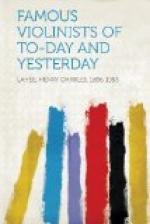“These distinguished individuals are now at Nashville, giving high pressure concerts, and selling tickets at two dollars apiece, when convenient. A stage-load and a half or two stage-loads of ladies and gentlemen went down from this place to hear them. Thalberg is said to be death, in its most horried shape, on the piano, and it is probably true; while Vieuxtemps is represented as a fiddler of considerable skill, considering his opportunities, which he no doubt is. We haven’t heard either of them since they were quite small, and unless they come out here and reduce the price of their tickets to their value,—say about sixty-two and a half cents a dozen,—it is possible that we sha’n’t hear them any more. When we ride forty miles, at an expense of at least ten dollars, extras not included, to hear a couple of itinerant Dutchmen torture a brace of unoffending instruments into fits, until the very spirit of music howls in sympathy, if some one will cave in our head with a brickbat, we will feel greatly obliged.
“But seriously, Thalberg and Vieuxtemps have never done us any harm that we know of, and we don’t suppose they intend to. We wouldn’t much mind hearing their music, for no doubt it is nearly, if not quite, as good as that of the average common run of Dutchmen, which, as the latter will tell you, is saying a good deal.”
And yet musical culture was said to be in its infancy in America at that time!
In Boston, Vieuxtemps, after an absence of fourteen years, was criticised thus: “We cannot see in M. Vieuxtemps the spark of genius, but he is a complete musician, and the master of his instrument. Tone so rich, so pure, so admirably prolonged and nourished, so literally drawn from the instrument, we have scarcely heard before; nor such vigour, certainty, and precision, such nobility and truth in every motion and effect. We recognise the weakness for sterile difficulties of extreme harmonics.”
Vieuxtemps was also subject to comparison with Sivori, rather to the former’s disparagement. “The one plays the violin like a great musician, the other like a spoiled child of nature, who has endowed him with the most precious gifts. Intrepid wrestlers, both, and masters of their instrument, they each employ a different manner. M. Vieuxtemps never lets you forget that he plays the violin, that the wonders of mechanism which he accomplishes under your eye are of the greatest difficulty and have cost him immense pains, whereas M. Sivori has the air of being ignorant that he holds in his hands one of the most complicated instruments that exists, and he sings to you like Malibran. He sings, he weeps, he laughs on the violin like a very demon.”
The following paragraph is a good sample of New York musical journalism in the year 1844:




